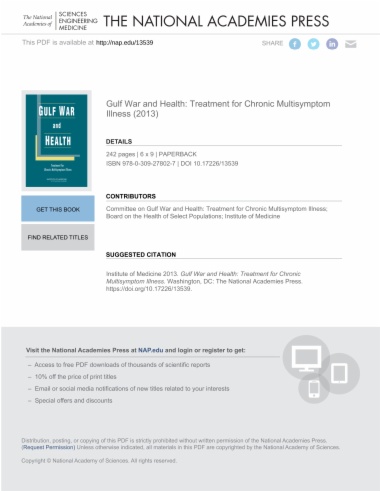

Chronic multisymptom illness (CMI) is a serious condition that imposes an enormous burden of suffering on our nation's veterans. Veterans who have CMI often have physical symptoms (such as fatigue, joint and muscle pain, and gastrointestinal symptoms) and cognitive symptoms (such as memory difficulties). For the purposes of this report, the committee defined CMI as the presence of a spectrum of chronic symptoms experienced for 6 months or longer in at least two of six categories—fatigue, mood, and cognition, musculoskeletal, gastrointestinal, respiratory, and neurologic—that may overlap with but are not fully captured by known syndromes (such as CFS, fibromyalgia, and IBS) or other diagnoses. Despite considerable efforts by researchers in the United States and elsewhere, there is no consensus among physicians, researchers, and others as to the cause of CMI. There is a growing belief that no specific causal factor or agent will be identified. Many thousands of Gulf War veterans1 who have CMI live with sometimes debilitating symptoms and seek an effective way to manage their symptoms. Estimates of the numbers of 1991 Gulf War veterans who have CMI range from 175,000 to 250,000 (about 25-35% of the 1991 Gulf War veteran population), and there is evidence that CMI in 1991 Gulf War veterans may not resolve over time. Preliminary data suggest that CMI is occurring in veterans of the Iraq and Afghanistan wars as well.
In addition to summarizing the available scientific and medical literature regarding the best treatments for chronic multisymptom illness among Gulf War veterans, Gulf War and Health: Volume 9: Treatment for Chronic Multisymptom Illness recommends how best to disseminate this information throughout the VA to improve the care and benefits provided to veterans, recommends additional scientific studies and research initiatives to resolve areas of continuing scientific uncertainty and recommends such legislative or administrative action as the IOM deems appropriate in light of the results of its review.